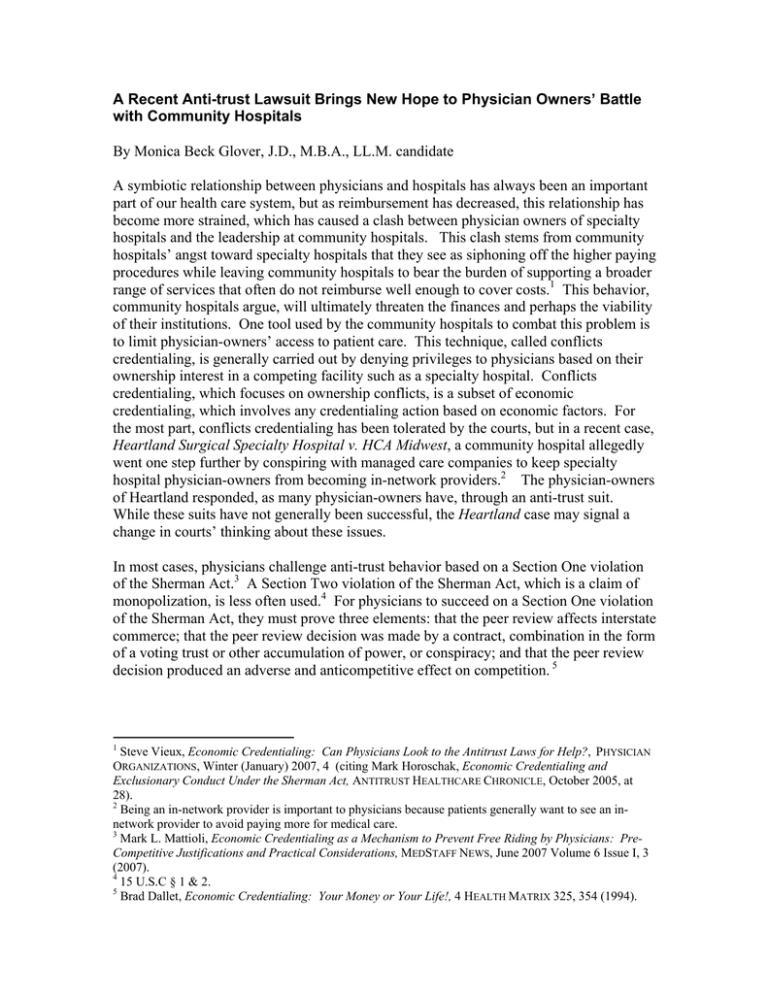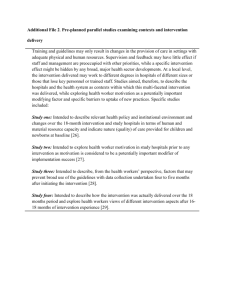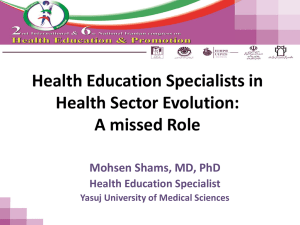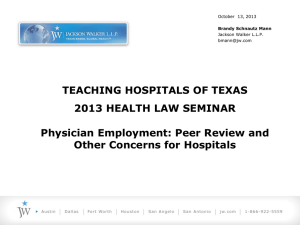A Recent Anti-trust Lawsuit Brings New Hope to Physician Owners’... with Community Hospitals By Monica Beck Glover, J.D., M.B.A., LL.M. candidate
advertisement

A Recent Anti-trust Lawsuit Brings New Hope to Physician Owners’ Battle with Community Hospitals By Monica Beck Glover, J.D., M.B.A., LL.M. candidate A symbiotic relationship between physicians and hospitals has always been an important part of our health care system, but as reimbursement has decreased, this relationship has become more strained, which has caused a clash between physician owners of specialty hospitals and the leadership at community hospitals. This clash stems from community hospitals’ angst toward specialty hospitals that they see as siphoning off the higher paying procedures while leaving community hospitals to bear the burden of supporting a broader range of services that often do not reimburse well enough to cover costs.1 This behavior, community hospitals argue, will ultimately threaten the finances and perhaps the viability of their institutions. One tool used by the community hospitals to combat this problem is to limit physician-owners’ access to patient care. This technique, called conflicts credentialing, is generally carried out by denying privileges to physicians based on their ownership interest in a competing facility such as a specialty hospital. Conflicts credentialing, which focuses on ownership conflicts, is a subset of economic credentialing, which involves any credentialing action based on economic factors. For the most part, conflicts credentialing has been tolerated by the courts, but in a recent case, Heartland Surgical Specialty Hospital v. HCA Midwest, a community hospital allegedly went one step further by conspiring with managed care companies to keep specialty hospital physician-owners from becoming in-network providers.2 The physician-owners of Heartland responded, as many physician-owners have, through an anti-trust suit. While these suits have not generally been successful, the Heartland case may signal a change in courts’ thinking about these issues. In most cases, physicians challenge anti-trust behavior based on a Section One violation of the Sherman Act.3 A Section Two violation of the Sherman Act, which is a claim of monopolization, is less often used.4 For physicians to succeed on a Section One violation of the Sherman Act, they must prove three elements: that the peer review affects interstate commerce; that the peer review decision was made by a contract, combination in the form of a voting trust or other accumulation of power, or conspiracy; and that the peer review decision produced an adverse and anticompetitive effect on competition. 5 1 Steve Vieux, Economic Credentialing: Can Physicians Look to the Antitrust Laws for Help?, PHYSICIAN ORGANIZATIONS, Winter (January) 2007, 4 (citing Mark Horoschak, Economic Credentialing and Exclusionary Conduct Under the Sherman Act, ANTITRUST HEALTHCARE CHRONICLE, October 2005, at 28). 2 Being an in-network provider is important to physicians because patients generally want to see an innetwork provider to avoid paying more for medical care. 3 Mark L. Mattioli, Economic Credentialing as a Mechanism to Prevent Free Riding by Physicians: PreCompetitive Justifications and Practical Considerations, MEDSTAFF NEWS, June 2007 Volume 6 Issue I, 3 (2007). 4 15 U.S.C § 1 & 2. 5 Brad Dallet, Economic Credentialing: Your Money or Your Life!, 4 HEALTH MATRIX 325, 354 (1994). Physicians have had difficulties demonstrating these elements for several reasons including that they are usually unable to prove a “contract, combination, or conspiracy.”6 Physicians also struggle to prove Section One anti-trust claims because hospitals do not often have the market power that is required for a Section One violation.7 Lastly, physician owners also fail to prove an anti-trust claim because they often find it difficult to show that there was a restraint on trade. This is true because generally “a finding that a single physician was damaged . . . from a single hospital is usually insufficient.”8 In Heartland Surgical Specialty Hospital v. HCA Midwest, the group of physicians who own Heartland Surgical Specialty Hospital alleged that the managed care companies and the community hospitals conspired to keep Heartland from contracting with managed care companies to be in-network providers. This lawsuit began in April 2005, and while some defendants settled with Heartland, several defendants including four hospitals remain. The remaining defendants lost their motion for summary judgment in October, 2007 and the jury trial will begin April 1 of this year.9 In the hearing completed in October, the Kansas District Judge agreed that there was enough evidence of an anti-trust violation to move forward. First, the judge found that there was potentially evidence of a conspiracy between the hospitals and the managed care companies. Additionally the judge agreed that the Heartland physicians may be able to prove the that the defendants had the required market power because “[t]he hospital defendants combined, including the settling parties, control 74% of the local market. . .[and] all of the health plan defendants originally named in the case account for approximately 90% of managed care enrollees in the Kansas City area.”10 The judge also determined that the restraint on trade element of a Section One claim may also be proved by the Heartland physicians because a boycott by the community hospitals and managed care companies may serve as the required restraint on trade.11 The judge’s denial of the motion for summary judgment12 indicates that the physician owners may have an opportunity to prevail on their anti-trust claim. The Heartland case is a good indication of the perseverance with which physicians continue to battle community hospitals’ attempts to limit their access to patients.13 The case is also a good indication that, while some limitation to patients may be tolerated such as through conflicts credentialing, any further attempt may be found to be a serious violation of federal laws. But even if physicians lose the battle in anti-trust lawsuits, states that believe as a policy matter that any limitation on access to patients should not be allowed always have the opportunity to enact laws that specifically prohibit this 6 Cohen, supra note 7, at 718. Id. (citing Jefferson Parish Hosp. Dist. No. 2 v. Hyde, 466 U.S. 2, 26-27 (1984)). 8 Beverly Cohen, An Examination of the Right of Hospitals to Engage in Economic Credentialing, 77 TEMP. L. REV. 717,718 (2004) (citing Belmar v. Cipolla, 475 A.2d 533, 538 (N.J. 1984)). 9 Jury Trial is Scheduled in Heartland Spine Lawsuit, KAN. CITY BUS. J., Oct. 19, 2007, available at http://kansascity.bizjournals.com/kansascity/stories/2007/10/15/daily30.html?jst=pn_pn_lk. 10 Amy Lynn Sorrel, Physician Owned Hospital Can Pursue Anti-trust Lawsuit, AMERICAN MEDICAL NEWS, Nov. 5, 2007, available at http://www.ama-assn.org/amednews/2007/11/12/gvsa1112.htm. 11 Heartland Surgical Specialty Hospital, LLC v. Midwest Division, Inc. d/b/a HCA Midwest Division, et al., No. 05-2164-MLB (D. Kansas filed Oct. 1, 2007). 12 Id. 13 Id. 7 2 behavior. Of course states that do not support the idea of specialty hospitals have the opportunity to enact laws that would limit or eliminate specialty hospitals as they exist today. The ultimate outcome is important, not just for physicians and hospitals, but for the patients affected by the decisions and the health care system as a whole. 3









